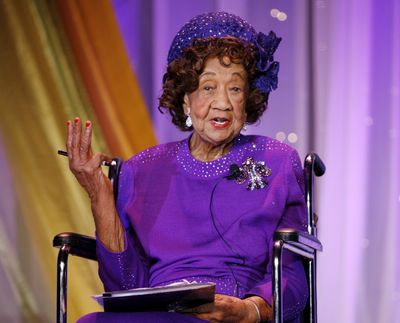Civil rights advocate also stood up for women
Family activist and feminist Dorothy Height, 98, dies

Dorothy Height, who was called the queen mother of the civil rights movement through seven decades of advocacy for racial equality – including 41 years as president of the National Council of Negro Women – has died. She was 98.
Height, who also played a key role in integrating the YWCA, died Tuesday of natural causes at Howard University Hospital in Washington, D.C.
Though not nearly as well known as her male contemporaries, Height was a steadfast presence in the civil rights movement. Often the only woman at strategy meetings with the Rev. Martin Luther King Jr. and other leaders, she was a determined voice pressing the importance of issues affecting women and children, such as child care and education.
Beginning in the 1930s, she helped shape the national agenda for the YWCA. Traveling throughout the nation, she prodded local chapters to implement interracial charters at a time when racial segregation was still the order of the day and resistance to integration was often fierce.
As president of the National Council of Negro Women from 1957 to 1998, she led the group to expand its mission. Her initiatives included training thousands of women to work as community advocates. Back in their own communities, they pushed for better housing, schools and stores. It was a way to help women escape what Height called the “triple bind of racism, sexism and poverty.”
One of Height’s most visible accomplishments was the Black Family Reunion Celebration, a three-day cultural event in Washington, D.C., with related events around the country. Founded to counter negative images of the African-American family, it has been held annually since 1986.
“Her fingerprints are quietly embedded in many of the transforming events of the last six decades as blacks, women, and children pushed open and walked through previously closed doors of opportunity,” Marian Wright Edelman, founder of the Children’s Defense Fund, wrote in 2006 in the Baltimore Times.
Eleanor Smeal, president of the Feminist Majority Foundation, told the Los Angeles Times in an interview, “Dorothy understood from the beginning the importance of both the civil rights movement and the women’s rights movement and how they’re intertwined.”